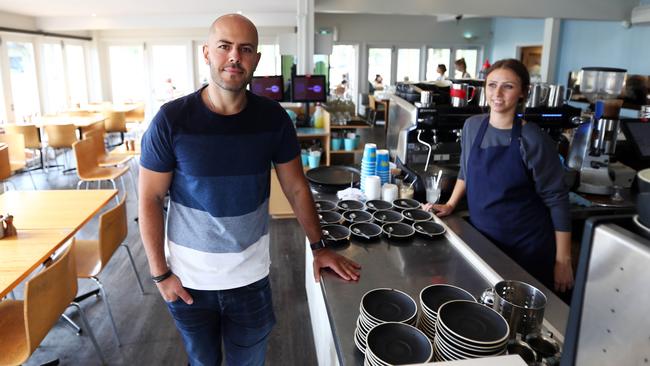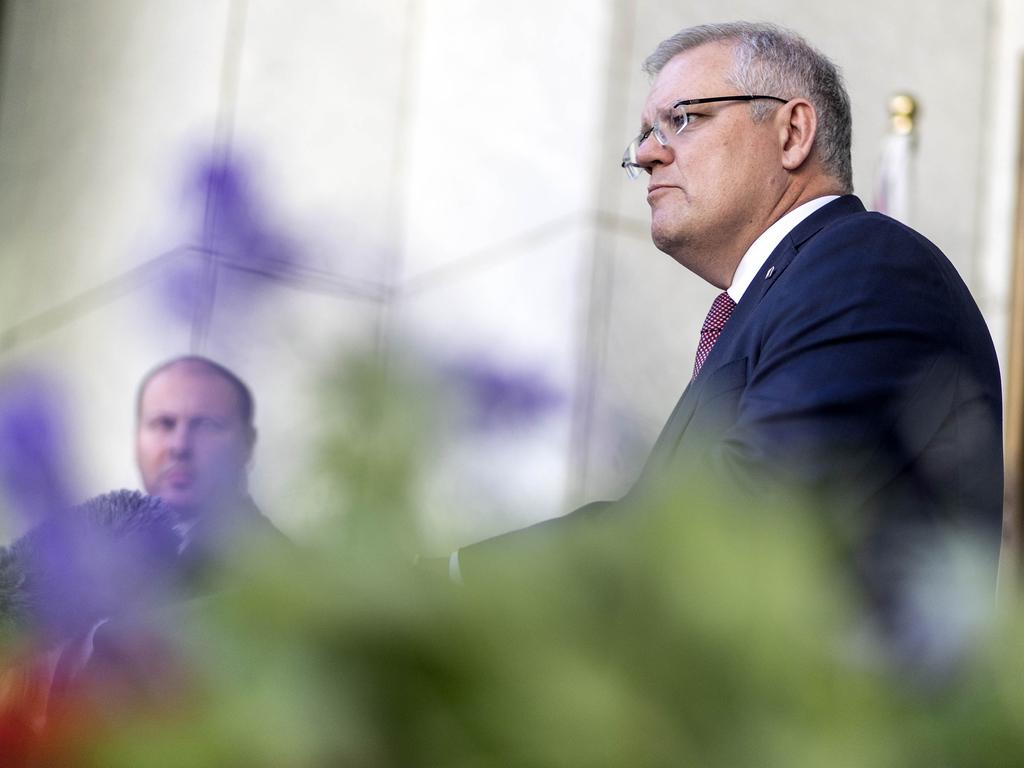Banks’ $100bn lifeline in time of coronavirus
Banks have thrown a lifeline to small businesses by offering six-month repayment holidays on loans totalling up to $100bn.

Banks have thrown a lifeline to small businesses by offering six-month repayment holidays on loans totalling up to $100bn, while Scott Morrison delayed the budget until October in response to the “great uncertainty” wrought by the COVID-19 pandemic.
Josh Frydenberg said the banks’ move was a “game-changer”, while business hailed the step as the most significant contribution to the sector “in living memory”, as new restrictions on indoor venues brought the shutters down on more of the national economy.
The banks’ small business rescue package was released as COVID-19 infections rose by 164 cases to 875 on Friday — the steepest daily rise in Australia since the pandemic began. Global infections have reached 250,000, with about 10,000 deaths.
Health officials in NSW were scrambling on Friday to contact 2700 passengers who disembarked from a cruise ship in Sydney a day earlier, after testing of more than a dozen people who complained of flu-like symptoms on board the vessel returned four positive results for COVID-19.
Joining the government and the Reserve Bank in efforts to support the economy during the pandemic, NAB, Westpac and ANZ on Friday offered a repayment deferral of up to six months for mortgage customers struggling to meet their obligations, while all lenders slashed rates on small business products and fixed-term home loans.
On Thursday the RBA announced it would flood the banking system with $90bn in cheap funding, and on Friday it spent $5bn buying bonds on the first day of an open-ended intervention aimed at lowering longer-term interest rates.
The Weekend Australian understands the initial loan deferral timeframe was three months, but the Prime Minister insisted on a six-month provision that Mr Frydenberg successfully negotiated with the banks and the financial regulators. The Treasurer said the response from the banks would provide a “big boost to the confidence of small businesses at this difficult time”.
“The banks have stepped up to the plate and are playing their role as part of Team Australia,” he said.
Mr Morrison said the uncertainty associated with the health crisis had forced the government to delay the budget until October 6, while Mr Frydenberg said the national debt ceiling would be lifted to $850bn from $600bn as the government finalises a substantial fiscal bailout.
The second, larger stimulus package will be unveiled this weekend ahead of a single parliamentary sitting day on Monday. Opposition Leader Anthony Albanese said he would “be supportive of any measures in terms of economic stimulus”.
ANZ chief executive Shayne Elliott said there were restaurants facing a 90 per cent plunge in turnover as increasingly strict social distancing measures kept people at home. “These businesses are fundamentally good business,” Mr Elliott said. “This is the best thing we can do and it’s in our best interest to see them through this, to help them survive this and come out the other side.”
Mr Elliott said the bank would not be putting struggling business owners — or homeowners — through a lengthy assessment program to judge their eligibility for a pause on the repayments. “If you are current on your loans, all you have to do is ask,” he said.
Mr Elliott said he had put on an extra 80 staff in call centres but called on bank customers to be patient if faced with longer than usual wait times.
Labor Treasury spokesman Jim Chalmers and opposition finance spokeswoman Katy Gallagher acknowledged the difficult circumstances, but called on the government not to delay the budget, saying it was “critically important that the Australian people are kept updated about the current state of the economy and the budget”.
Business groups welcomed the banks’ position. The Australian Chamber of Commerce and Industry said it would “save thousands of businesses and the thousands of people who depend on them”. ACCI chief executive James Pearson said the banks’ decision was the “most significant contribution to small business in living memory”.
Council of Small Business Organisations Australia chief executive Peter Strong said the announcement by the banks was bigger than expected.
“I was hoping for three months (of relief), but to get six was quite exceptional,” he said.
Andre Salem, owner of the North Point cafe in Melbourne’s Brighton for the past 15 years, said the move by the banks would be great for a lot of industries and people. “It will give them a bit of hope that they can keep their head above water,” Mr Salem said. “Something so they can just pause until this blows over without going too far into debt and defaulting.”
He said the move might be the difference between a business opening and shutting. “If you stay open there are more jobs for people,” he said.
NAB, Westpac and ANZ cut rates across a range of small-business loan and overdraft products by up to two percentage points, following similar moves by Commonwealth Bank the day before.
Banks also cut fixed-term mortgage rates by up to one point, with ANZ also reducing variable home loan rates by 0.15 percentage points. All banks besides ANZ boosted term deposit rates, as Westpac announced a $10bn home lending fund.
Australian Banking Association chief executive Anna Bligh said the package would start on Monday and apply to more than $100bn of existing business loans. The ABA estimates the measures could provide $8bn worth of relief to small business owners.
“Banks will make sure this deferral is available to any small business in critical need because of COVID-19,” Ms Bligh said. “Australia’s banks have supported the country through difficult times in the past and continue to do so.”
Ms Bligh said lenders were acting “as fast as possible for small businesses to avoid more people being out of work and falling into mortgage distress”.
She said banks were receiving an “exponentially increasing volume of calls from small businesses in distress and who are unable to meet repayments”.
On Friday, S&P Global Ratings said the RBA’s term funding facility, and a similar measure in New Zealand, “should allay fears that the countries’ financial institutions face an imminent funding or liquidity crisis due to the COVID-19 outbreak”. Moody’s issued a similar notice.
Bank stocks on Friday led a welcome, if modest, rebound on the ASX, with the benchmark S&P/ASX 200 sharemarket index lifting 0.7 per cent on the day, but still ending the week off 13 per cent at 4817 points. Westpac shares jumped 8.5 per cent, NAB climbed 7.5 per cent and ANZ rose 6.8 per cent, while CBA eased 1.7 per cent.
Additional reporting: Tessa Akerman







To join the conversation, please log in. Don't have an account? Register
Join the conversation, you are commenting as Logout